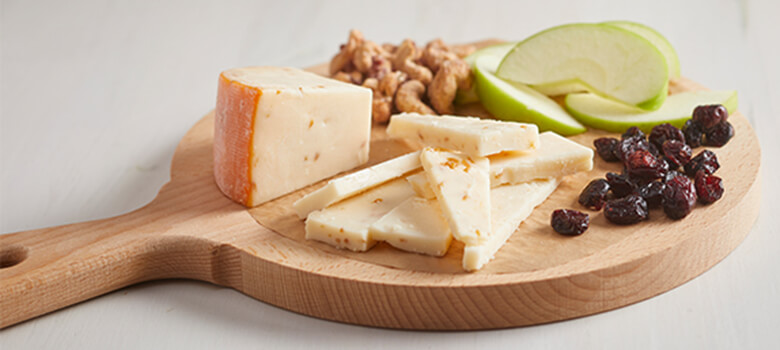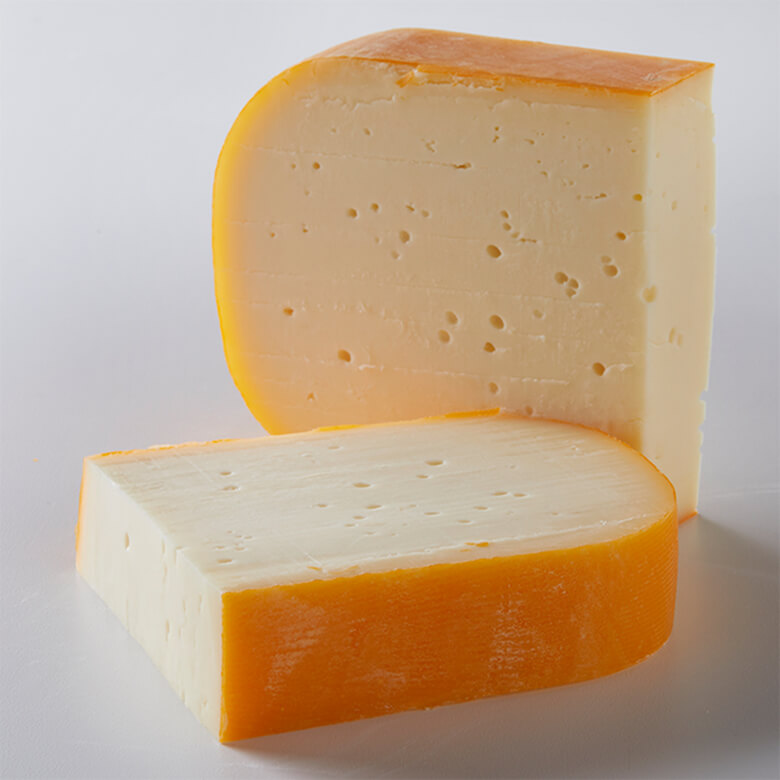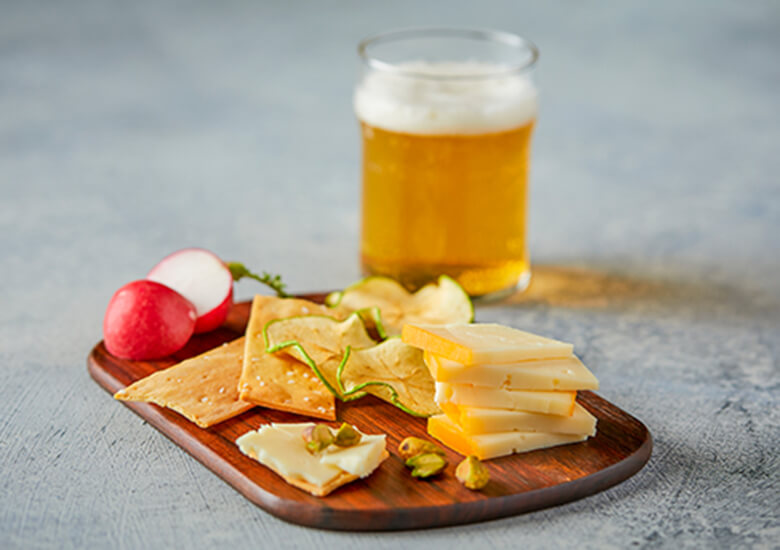Ever picked up gouda in the grocery store, curious about what this particular cheese has to offer? This mild, yellow cheese is a personal favorite here in Wisconsin due to how many types there are—one for every mood. From young to aged and spice-infused to herb-flecked, we’re firm believers that every variety is a goud-a time.
Wisconsin goudas draw upon their Dutch roots while using fresh Wisconsin Dairy to create a truly rind-blowing flavor experience. Let’s take an in-depth look at this special cheese, with everything from pronunciation tips to our favorite wine pairings
Cheese History: How gouda was born
Gouda is the epitome of a farmstead cheese in the Netherlands. First mentioned in 1284 and named for the city of Gouda, a major trade hub, gouda allowed the Netherlands' fast-growing dairy industry to take full advantage of its rich milk. Made in larger than usual wheels for the time, Dutch cheesemakers scalded and washed the curds with hot water to rapidly release moisture before pressing them into molds. It's also worth noting that all of this unintentionally created gouda's sweet flavor notes.
These early wheels were then brushed with a blend of saffron and vinegar, an early form of that signature yellow wax rind known today, to preserve the cheese as it traveled the oceans to its early fans.
All about gouda

How do you pronounce gouda?
While most Americans pronounce gouda like “goo-duh,” the Dutch pronounce it like “ghow-duh,” so it rhymes with the way a Bostonian would say the word chowder. Or, to be even more precise—since the Dutch don’t use a hard g sound—it’s more of a guttural h sound like the “ch” in challah.
So, you really pronounce it more like a “hhhow-duh,” as in “hhhow-duh you stop yourself from eating the whole thing?”
How is gouda made?
To make gouda, cheesemakers create curds from cultured milk by adding rennet, then wash the curds in hot water to remove some of the lactose. (This creates a sweeter cheese, since there’s less lactic acid produced.) Then, the mixture is pressed into a wheel-shaped mold and soaked in a brine solution. After drying for a few days, the cheese is coated in a yellow plastic or wax coating and tucked away to hibernate.
Gouda can be aged for anywhere between four weeks to over a year. As gouda ages, it develops in flavor and changes from semi-firm to hard and flakey.
What does gouda taste like?
Gouda comes in many different varieties, with lots of different flavor notes. Young gouda, aged just a few weeks, is sweet, mild, and a little fudgy. As gouda ages—months or even years—it develops more caramel notes, nuttiness, and even a little tang.
Cheese that has matured for many months develops a slight crunchiness from the cheese crystals that develop. Every gouda is a little bit different, though, so there’s even more reason to try all the goudas you can find.
How many types of gouda are there?
The limit does not exist! Between the different ages—young to mature to very old—and the flavor varieties out there, we’d wager that there may almost be infinite types of gouda.
Put a twist on the classic with a smoked gouda, a fenugreek-infused gouda, or a cumin-rubbed gouda. Or, try a bacon-filled gouda for a charcuterie board experience in every bite.
What’s the difference between aged and young gouda?
Young gouda is aged between 4 weeks and nine months, while aged gouda is stored anywhere from nine months to over two years. Young gouda is very mild and sweet, with a high moisture content and a smooth texture. It’s a great table cheese, perfect for everyday eating.
Aged gouda is similar to parmesan in texture, developing crunchy cheese crystals and a more crumbly texture. Aged gouda has a rich, nutty, caramelly taste, often reminiscent of butterscotch. Both aged gouda and young gouda are delicious, just in different ways.
Must-try Wisconsin Goudas

Jeffs’ Select Gouda: That apostrophe is in the right place—there are two Jeffs who created this beauty! Jeff Jirik and Jeff Wideman, both visionary cheese makers, collaborated to make this special cheese. While most goudas are aged in cold temperatures, Jeffs’ Select is aged in a warm, humid cave, resulting in a full-bodied cheese with nuttiness and a hint of caramel. Try sipping root beer along with this gouda for a special pairing.
Marieke® Gouda Plain Mature: Originally from the Netherlands, Marieke Penterman and her husband moved to Wisconsin and brought Dutch tradition with them. Marieke Gouda uses raw cow’s milk piped directly from the cows into the cheese-processing vat—it doesn’t get fresher than that! Her time-tested, Old World cheesemaking methods have produced an exceptional, award-winning gouda. Pair it with a PayDay bar—a candy bar filled with caramel and peanuts—for a sweet twist.
Saxon Creamery Big Ed’s Gouda: This is a rich cow’s milk gouda with bold butter notes and a bright grassy finish. Saxon Creamery’s Big Ed’s gouda was even named one of the Top 20 Cheeses in the World at the 2018 World Championship Cheese Contest!
Door Artisan Valmy: Valmy, a gouda-style cheese, comes from Door Artisan Cheese Company’s Master Cheesemaker Mike Brennenstuhl. This cheese has a stout beer washed rind, which imparts hints of yeast and malt with a slightly sweet flavor.
Pairing gouda

What accompaniments go well with gouda?
Gouda is wonderful with many different accompaniments. We love it with a dollop of apricot or orange jam, piled high atop a crisp cracker. For a pairing that leans more savory, try mango chutney or a mustard.
Especially on a cheese board, we suggest mixing fresh fruit—like apples, peaches, or pears—alongside dried fruit—dried apricots and cherries—for extra variety. If you have an aged gouda on hand, which is sweeter and more complex, opt for a sweet pairing with chocolate or even a brownie.
What beer goes well with gouda?
In general, lighter-style beers pair well with gouda, especially younger goudas. For an aged gouda, try a malty doppelbock or even a stout for its deeper flavor.
What wine pairs best with gouda?
When pairing white wine with gouda, opt for an off-dry white like riesling or unoaked chardonnay, whose lighter body and fruit notes will match gouda’s mild flavor. If red wine is more your style, select a lighter red like pinot grenache or Beaujolais.
What spirits should I have with gouda?
A finger of Scotch or bourbon is the perfect spirit to pair with gouda. Try a dark rum or a cognac with an aged, caramelized gouda.
If you’re ready to take a deeper look into the world of cheese pairing, we recommend starting with our beginner’s guide to cheese pairing.
Ready for a gouda-time?
If all this talk of gouda has gotten you hungry for a cheese tasting, you can get Wisconsin’s finest cheeses and cheese gift baskets delivered right to your door with our continuously updated list of cheesemakers and retailers that allow you to order cheese online. Award-winning Wisconsin Cheese is just a click away.
Craving something else? Choose from our selection of over 400 recipes featuring Wisconsin Cheese. Don’t forget to share your creative cheesy creations with us on Facebook and Instagram.
